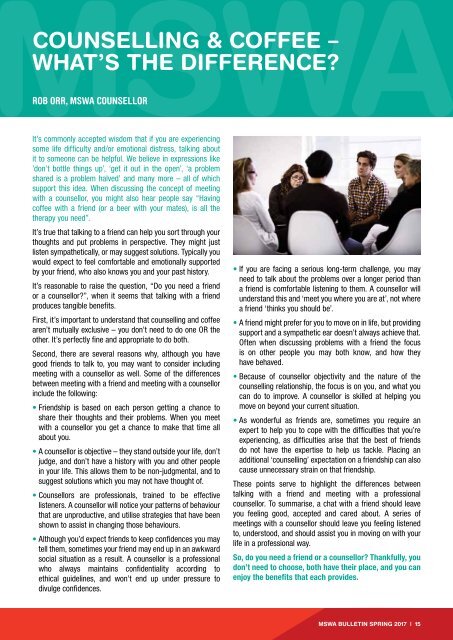MSWA Bulletin Magazine Spring
Create successful ePaper yourself
Turn your PDF publications into a flip-book with our unique Google optimized e-Paper software.
COUNSELLING & COFFEE –<br />
WHAT’S THE DIFFERENCE?<br />
ROB ORR, <strong>MSWA</strong> COUNSELLOR<br />
It’s commonly accepted wisdom that if you are experiencing<br />
some life difficulty and/or emotional distress, talking about<br />
it to someone can be helpful. We believe in expressions like<br />
’don’t bottle things up’, ‘get it out in the open’, ‘a problem<br />
shared is a problem halved’ and many more – all of which<br />
support this idea. When discussing the concept of meeting<br />
with a counsellor, you might also hear people say “Having<br />
coffee with a friend (or a beer with your mates), is all the<br />
therapy you need”.<br />
It’s true that talking to a friend can help you sort through your<br />
thoughts and put problems in perspective. They might just<br />
listen sympathetically, or may suggest solutions. Typically you<br />
would expect to feel comfortable and emotionally supported<br />
by your friend, who also knows you and your past history.<br />
It’s reasonable to raise the question, “Do you need a friend<br />
or a counsellor?”, when it seems that talking with a friend<br />
produces tangible benefits.<br />
First, it’s important to understand that counselling and coffee<br />
aren’t mutually exclusive – you don’t need to do one OR the<br />
other. It’s perfectly fine and appropriate to do both.<br />
Second, there are several reasons why, although you have<br />
good friends to talk to, you may want to consider including<br />
meeting with a counsellor as well. Some of the differences<br />
between meeting with a friend and meeting with a counsellor<br />
include the following:<br />
• Friendship is based on each person getting a chance to<br />
share their thoughts and their problems. When you meet<br />
with a counsellor you get a chance to make that time all<br />
about you.<br />
• A counsellor is objective – they stand outside your life, don’t<br />
judge, and don’t have a history with you and other people<br />
in your life. This allows them to be non-judgmental, and to<br />
suggest solutions which you may not have thought of.<br />
• Counsellors are professionals, trained to be effective<br />
listeners. A counsellor will notice your patterns of behaviour<br />
that are unproductive, and utilise strategies that have been<br />
shown to assist in changing those behaviours.<br />
• Although you’d expect friends to keep confidences you may<br />
tell them, sometimes your friend may end up in an awkward<br />
social situation as a result. A counsellor is a professional<br />
who always maintains confidentiality according to<br />
ethical guidelines, and won’t end up under pressure to<br />
divulge confidences.<br />
• If you are facing a serious long-term challenge, you may<br />
need to talk about the problems over a longer period than<br />
a friend is comfortable listening to them. A counsellor will<br />
understand this and ‘meet you where you are at’, not where<br />
a friend ‘thinks you should be’.<br />
• A friend might prefer for you to move on in life, but providing<br />
support and a sympathetic ear doesn’t always achieve that.<br />
Often when discussing problems with a friend the focus<br />
is on other people you may both know, and how they<br />
have behaved.<br />
• Because of counsellor objectivity and the nature of the<br />
counselling relationship, the focus is on you, and what you<br />
can do to improve. A counsellor is skilled at helping you<br />
move on beyond your current situation.<br />
• As wonderful as friends are, sometimes you require an<br />
expert to help you to cope with the difficulties that you’re<br />
experiencing, as difficulties arise that the best of friends<br />
do not have the expertise to help us tackle. Placing an<br />
additional ‘counselling’ expectation on a friendship can also<br />
cause unnecessary strain on that friendship.<br />
These points serve to highlight the differences between<br />
talking with a friend and meeting with a professional<br />
counsellor. To summarise, a chat with a friend should leave<br />
you feeling good, accepted and cared about. A series of<br />
meetings with a counsellor should leave you feeling listened<br />
to, understood, and should assist you in moving on with your<br />
life in a professional way.<br />
So, do you need a friend or a counsellor? Thankfully, you<br />
don’t need to choose, both have their place, and you can<br />
enjoy the benefits that each provides.<br />
<strong>MSWA</strong> BULLETIN SPRING 2017 | 15


















